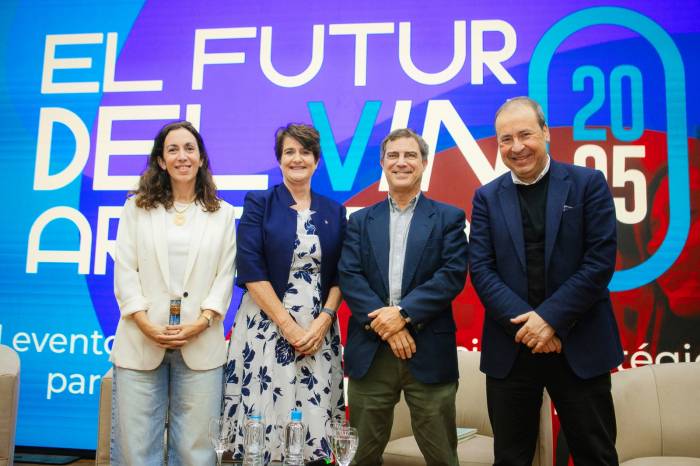Low-Alcohol Wine Could Reach 4.4 Million Argentine Households, Study Finds
Interest in lighter wine options grows as health concerns drive demand, but awareness and taste perceptions remain key challenges.
2025-11-12

The third edition of “El Futuro del Vino Argentino” took place in Mendoza, Argentina, bringing together leading figures from the wine industry to discuss the current challenges and opportunities facing the sector. Organized by the Fondo Vitivinícola and the Corporación Vitivinícola, the event focused on global and local trends, changes in consumer habits, and strategies for expanding the market for Argentine wine.
One of the main topics was the potential for low-alcohol wines in Argentina. Carolina Nuñez, a consultant with WorldPanel By Numerator, presented data from a study tracking purchasing behavior in 5,300 households. The research showed that wine remains the second most popular alcoholic beverage in Argentina after beer, with a 72% penetration rate among households. While wine has regained its pre-pandemic buyer base for the third consecutive year, both wine and beer have seen a decline in purchase frequency.
Nuñez highlighted the rapid growth of non-alcoholic beer, which has quadrupled its market penetration in just four years. Seven out of ten buyers now choose non-alcoholic beer as an alternative when they do not want to consume alcohol. This trend is supported by competitive pricing and strong promotional activity. In contrast, only two out of ten consumers are familiar with low-alcohol wine, but nearly half expressed interest in buying it. The study estimates that about 4.4 million Argentine households could be potential buyers of low-alcohol wine, and one in four would be willing to pay more for it. Health concerns are the main reason for choosing these products, while fears about losing enjoyment or changes in taste compared to traditional wine remain barriers.
Guillermo Oliveto, a business strategy consultant, emphasized that awareness of low-alcohol wines is still low among consumers. However, when presented with their benefits—such as being lighter, fresher, lower in calories, and less likely to cause drowsiness—consumer perception improves significantly. Oliveto argued that these attributes make low-alcohol wines a true innovation that can attract new consumers and create new occasions for wine consumption.
Oliveto also discussed the growing popularity of canned wine among younger consumers. He noted that its appeal lies in convenience, individual serving sizes, and variety. However, he pointed out that this format is still mostly chosen by younger people looking for a more relaxed approach to drinking wine.
Andrés Malamud, a political scientist and international relations expert based at the University of Lisbon, addressed Argentina’s position in the global context. He described three major disruptions affecting the world: demographic shifts, geographic changes, and technological advances. Malamud explained that Argentina’s efforts to stabilize itself are taking place in an increasingly unstable world. He noted that while Asia seemed like an obvious partner due to its large population, Argentina’s current government has chosen to align more closely with the United States. According to Malamud, this strategy could position Argentina as a stable outpost on the periphery of global conflicts—a potential advantage given today’s geopolitical tensions.
Yvette Van Der Merwe, president of the International Organisation of Vine and Wine (OIV), spoke about sustainability and innovation as key issues for the future of winemaking. She stressed that climate change and sustainability are now central challenges for the industry worldwide. Van Der Merwe encouraged industry leaders to invest in understanding new consumer perspectives and to use scientific approaches when discussing wine’s role in health and society. She said Argentina is well placed to turn global challenges into opportunities by focusing on cooperation, science, innovation, premiumization, sustainability, and strategic trade.
The event drew more than 300 participants from across the industry. Speakers agreed that listening to consumers and adapting to new trends will be essential for Argentine wine producers seeking growth at home and abroad. The forum provided a platform for sharing data-driven insights and exploring how innovation can help Argentine wine remain competitive in a changing world.
Founded in 2007, Vinetur® is a registered trademark of VGSC S.L. with a long history in the wine industry.
VGSC, S.L. with VAT number B70255591 is a spanish company legally registered in the Commercial Register of the city of Santiago de Compostela, with registration number: Bulletin 181, Reference 356049 in Volume 13, Page 107, Section 6, Sheet 45028, Entry 2.
Email: [email protected]
Headquarters and offices located in Vilagarcia de Arousa, Spain.